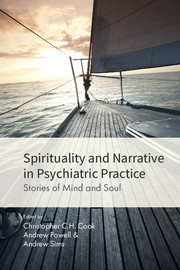Book contents
- Frontmatter
- Contents
- List of contributors
- Foreword
- Preface
- 1 Narrative in psychiatry, theology and spirituality
- 2 Spirituality and transcultural narratives
- 3 Psychopathology and the clinical story
- 4 Helping patients tell their story: narratives of body, mind and soul
- 5 Gods lost and found: spiritual coping in clinical practice
- 6 Stories of joy and sorrow: spirituality and affective disorder
- 7 Stories of fear: spirituality and anxiety disorders
- 8 Stories of transgression: narrative therapy with offenders
- 9 Narratives of transformation in psychosis
- 10 My story: a spiritual narrative
- 11 God's story revealed in the human story
- 12 Meaning without ‘believing’: attachment theory, mentalisation and the spiritual dimension of analytical psychotherapy
- 13 Stories of living with loss: spirituality and ageing
- 14 Beginnings and endings
- Index
13 - Stories of living with loss: spirituality and ageing
Published online by Cambridge University Press: 02 January 2018
- Frontmatter
- Contents
- List of contributors
- Foreword
- Preface
- 1 Narrative in psychiatry, theology and spirituality
- 2 Spirituality and transcultural narratives
- 3 Psychopathology and the clinical story
- 4 Helping patients tell their story: narratives of body, mind and soul
- 5 Gods lost and found: spiritual coping in clinical practice
- 6 Stories of joy and sorrow: spirituality and affective disorder
- 7 Stories of fear: spirituality and anxiety disorders
- 8 Stories of transgression: narrative therapy with offenders
- 9 Narratives of transformation in psychosis
- 10 My story: a spiritual narrative
- 11 God's story revealed in the human story
- 12 Meaning without ‘believing’: attachment theory, mentalisation and the spiritual dimension of analytical psychotherapy
- 13 Stories of living with loss: spirituality and ageing
- 14 Beginnings and endings
- Index
Summary
Loss occurs throughout life but is often concentrated in old age. However, late life can also be seen as a time of positive personal development when new conflicts are resolved. Development is a dynamic process which may occur whenever an individual faces challenges, including the challenges of loss. Many old people cope with these losses with amazing resilience. Where do narrative and spirituality come into this? Indeed, what are narrative and spirituality in this context?
Narrative in context
The idea of narrative in medical practice and research has ‘come of age’. Listening to people's stories is an essential part of holistic care. Reflecting on this, we remember how the interpersonal aspects of healthcare have always been as important as the technical aspects. We have advised students when taking a history with a ‘difficult’ patient to drop the schema of the medical history and try to simply listen empathetically to the patient telling their story. This is a skill that is often acquired only after years of practice. The standard psychiatric history nevertheless forms a focused schema for efficiently ensuring that all relevant parts of the story are heard, and the old-fashioned psychiatric formulation is still important as a way of ensuring that all relevant aspects of the narrative are considered before a care or management plan is developed.
Narrative has also to be set in the context of the world view and mindset of the individual patient and practitioner. World views have to do with the presuppositions that shape the thinking and activity of members of a culture or society. Wright (1992) states: ‘Wherever we find the ultimate concerns of human beings we find world views’ (p. 122). According to Wright, world views characteristically do four things: they provide stories (or narratives) through which people view reality; these stories help to define and answer the basic questions of human existence; they are associated with a series of cultural symbols; and they provide praxis, a ‘way-of-being-in-the-world’ that derives from the narrative and how it addresses fundamental questions of the culture.
- Type
- Chapter
- Information
- Spirituality and Narrative in Psychiatric Practice , pp. 160 - 172Publisher: Royal College of PsychiatristsPrint publication year: 2016



